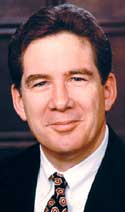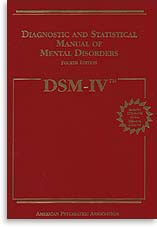
Drug ’Em All!
Proposition 63 leads with the assertion that “mental illness is extremely common,” an assertion that initiative backers seek to cement by voting it into law. With this comes the claim that early detection and treatment reduces the risk of suicide, a claim completely debunked by recent Columbia University studies commissioned by the U.S. Food and Drug Administration, which show that psycho-pharma’s “wonder” antidepressants in fact can increase the risk of suicide 200 to 300 percent compared to placebo use. As well, Fox TV’s national news investigator, Douglas Kennedy, this year obtained confidential drug company documents proving that an individual is eight times more likely to commit suicide if he was taking an antidepressant.
So what does Prop 63 use as its authoritative source for those “extremely common” mental disorders? The results of votes taken by psychiatrists at their national convention, as published in the Diagnostic and Statistical Manual of Mental Disorders (DSM), now in its fourth printing (see “Manufacturing ‘Madness’”).
A peek at DSM-IV’s contents can be most informative. As expected, schizophrenia is listed, as are various conditions grouped under Depression and Compulsion. Dig a little deeper, though, and you will discover such gems as Mathematical Disorder (yes, it means you have a hard time with math), Expressive Language Disorder (for those with a limited vocabulary), and Caffeine Intoxication, whose symptoms are alleged to include the jitters and an inability to sleep. Acknowledging that people build up a tolerance to caffeine, the DSM notes that this particular “mental disorder” affects mostly those who are not habitual coffee drinkers.
But, just in case the American psychiatric cabal and their DSM-IV aren’t comprehensive enough, Prop 63 has additional language, ostensibly to help us to spot those in need of treatment. Specifically, it refers to the Welfare and Institutions Code, Division 5, Section 5600.3, where we find a page of fine print defining the “eligible populations.” For children, it’s those exhibiting “behavior inappropriate to the child’s age,” as evidenced by impairment in “self-care, school functioning, family relationships, or ability to function in the community.”
These terms, each subjective and vague enough to be applied to almost any child at one time or another, set any child up as a new and unwitting psycho-pharma clientele. Once labeled, the child becomes “eligible” for dosing with strong mind-altering drugs, or even removal from their homes to an institution.
As an example of the potential for abuse of this program, a report by the President’s Commission on Excellence in Special Education revealed that 2.4 million American children who had been diagnosed with “mental disorders” and placed in special education programs had in fact simply not been taught to read.
Thwarting Psychiatry’s Ploy
|
• •
• • • • • • • •
|
 “Prop 63, if passed, will lead more kids into the hands of mental health practitioners and psychiatric drug makers who push stimulants ... that can cause long term changes in the brain ... and other severe side effects.”
“Prop 63, if passed, will lead more kids into the hands of mental health practitioners and psychiatric drug makers who push stimulants ... that can cause long term changes in the brain ... and other severe side effects.”
— Karen Kammerer, 25-year special ed teacher
|
|
• •
• • • • • • • •
|
In case you doubt that Prop 63 is aimed at drugging your children, you should know that Assemblyman Darrell Steinberg (D-Sac), one of the initiative’s co-authors, has repeatedly introduced legislation on behalf of psycho-pharma interests for mandatory mental health screening of children.
Steinberg’s attempt to create law that stigmatizes children through mandatory screening (proposed in 2003) would have required such tests for every child before they enter kindergarten. Typical of psychiatric screenings, Steinberg’s law would have seen to the labeling of children exhibiting such dubious symptoms as ‘excessive crying’ for children under 18 months of age. The California legislature, foreseeing the pitfalls of such unwieldy diagnoses, wisely scuttled Steinberg and company’s gulagish brainchild.
This is but the latest indicator of the state legislature’s broadening sensibilities in seeking to protect our children from indiscriminate psychiatric drugging — something a growing number of parents and teachers have come to appreciate. “There has been a distinct change of attitude and feelings in the state assembly over the past year,” noted Karen Kammerer, a 25-year veteran special education teacher for Silicon Valley district schools.
“Consensus agreements were reached in committees to limit the school’s ability to push these drugs on our children,” said Kammerer. “Previously, this concept was not even considered as the educational committee maintained there was no problem.”
Despite Steinberg’s ploy vis-à-vis Proposition 63, Kammerer told Freedom that legislators of late have come to a chilling conclusion: “They are really beginning to get the concept that our children are being drugged too much.”
“Now is not the time to close our eyes once again to this situation. Prop 63, if passed, will lead more kids into the hands of mental health practitioners and psychiatric drug makers who push stimulants like Ritalin, a cocaine-like drug that can cause long-term changes in the brain and has possible side effects, like Tourette’s syndrome [severe twitching],” warns Kammerer.
Big Brother on the Watch
Big Brother may have fathered Prop 63, but joining him on watch is big sister with an eye to your inheritance, your boss, your colleagues, your college professors, your classmates, your kids’ teachers, nurse Betty and possibly even Bob the plumber. Part 3.6, Section 5840 (b) (1) calls for “outreach to families, employers, primary care healthcare providers, and others to recognize the early signs of potentially severe and disabling mental illnesses.”
Sherman ‘Rusty’ Selix Jr., Steinberg’s mental health industry co-author of Prop 63, has tried on three separate occasions, with the Sacramento assemblyman greasing the lines, to push through the legislature an “educational plan” that would train school kids to report unusual behavior of their classmates, with the stated goal of early detection of schizophrenia and other mental disorders. So far these have all been defeated, but the chill this would place on students’ creativity and individuality is almost too great to contemplate, quite apart from the potential for deliberate abuse.
Although specifics of the Prop 63 outreach program are not spelled out, it bears the unmistakable mark of the Selix “education” plan, expanded to encompass the adult world as well.
It is not hard to imagine an eventual psychiatric police state, where someone around you is alert to every sign of nonconformity. In such a world, your choice is either to spy and pimp for the psychiatrists or become a suspect yourself.
Above the Law
|
• •
• • • • • • • • • •
• • • • • • • • • •
|
 “[Prop 63] sends a message that California really doesn’t want to encourage people who have wealth to be here. ... Driving the wealthy out of the state would end up hurting other programs, since the wealthiest citizens are a large revenue source for the state.”
“[Prop 63] sends a message that California really doesn’t want to encourage people who have wealth to be here. ... Driving the wealthy out of the state would end up hurting other programs, since the wealthiest citizens are a large revenue source for the state.”
—Larry McCarthy, President
California Taxpayers Association
|
|
• •
• • • • • • • • • •
• • • • • • • • • •
|
Another fundamental police state precept is to shield those in power from the harsh hand of government that ruins the lives of everyone else. If, as Prop 63 opponents argue, the measure is indeed a step in the direction of a psychiatric police state, then there should be evidence of such disrespect for existing law — and there is.
At the core of the bureaucratic comfort zone is the Department of Mental Health (DMH), where Prop 63 grants the authority to immediately “make any necessary expenditures and to hire staff” to implement the program “notwithstanding any other provision of law to the contrary.” (Emphasis added.) It also states that “the director may adopt all regulations pursuant to this Act as emergency regulations,” which can then be put into effect immediately and must be funded by the State Treasury.
Herein lies the bypass of the state’s constitutional watchdog, the Office of Administrative Law, whose function is to review regulations adopted by state government agencies. Administrative Law ensures that new regulations do not conflict with existing law or the California constitution and that funds are not funneled to personal expenses or other improper uses. Prop 63 claims specifically that its emergency “regulations shall not be subject to the review and approval of the Office of Administrative Law.” (Emphasis added.)
“This is setting the Department of Mental Health and its personnel above the law,” said Jeff Griffin, executive director of the Los Angeles chapter of the Citizens Commission on Human Rights. “No agency is above the law.”
Blink and You Miss the Trap Door
 “I am opposed to giving DMH [Department of Mental Health] any further funds and thus am opposed to Proposition 63 or any measure that seeks to give more money to potentially create more patient abuse.”
“I am opposed to giving DMH [Department of Mental Health] any further funds and thus am opposed to Proposition 63 or any measure that seeks to give more money to potentially create more patient abuse.”
— William Sargent, patients’ rights advocate
|
As a further move to insulate the Department of Mental Health from government control, the act would require a two-thirds majority in the legislature for any amendments, and these must be “consistent with and further the intent of this Act.” Prop 63 also specifically forbids state legislators from modifying the underlying laws upon which it is based so that initiative sponsors’ “purposes cannot be accomplished.”
Instead of subjecting itself to the California legislature’s review and control, Prop 63 proposes a Mental Health Services and Accountability Commission consisting of 16 members, 12 of whom must have “personal or family experience with mental illness.” No other professional qualifications are specified for this overwhelming majority of the commission — nor are the selection criteria or processes clear. The other four members include two each from the legislature and the administration.
The commission’s sole function can be little more than to serve as a rubber stamp for the Department of Mental Health because, while the commission can approve specific programs proposed by the DMH, it has no say whatsoever in how or where any of the Prop 63 money is spent.
In fact, nowhere in Prop 63 is there a provision for oversight on spending — not by the legislature, not by any citizens’ groups, not even within the DMH itself, and with no recourse for the voters, either.
Instead of correcting the failed psychiatric industry programs of the past — which the U.S. Department of Justice has found, statewide, to be abusive — Prop 63 will greatly expand psycho-pharmaceutical programs and thereby multiply the potential to destroy lives. At the same time, it shields the mental health industry from accountability to the citizens of California, while it destroys, as well, the state’s treasure — and future.
William Sargent, a mental health patient advocate whose brother was locked up and abused at Napa, casts the issue succinctly: “I am opposed to giving DMH [Department of Mental Health] any further funds and thus am opposed to Proposition 63 or any measure that seeks to give more money to potentially create more patient abuse.”
And to this, other critics add, unless the measure is killed at the polls on November 2, it will create even greater abuse of California’s compassionate, yet unsuspecting, voters.

